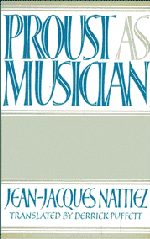Book contents
- Frontmatter
- Contents
- Preface to the English edition
- Translator's note
- 1 Introduction: Beyond the ‘little phrase’
- 2 Parsifal as redemptive model for the redemptive work
- 3 Music as redemptive model for literature
- 4 From Vinteuil to Schopenhauer
- 5 In conclusion: Quest for the essence and denial of the origin
- Appendix: Passages from A la recherche translated in the text
- Notes
- References
- Index
5 - In conclusion: Quest for the essence and denial of the origin
Published online by Cambridge University Press: 27 October 2009
- Frontmatter
- Contents
- Preface to the English edition
- Translator's note
- 1 Introduction: Beyond the ‘little phrase’
- 2 Parsifal as redemptive model for the redemptive work
- 3 Music as redemptive model for literature
- 4 From Vinteuil to Schopenhauer
- 5 In conclusion: Quest for the essence and denial of the origin
- Appendix: Passages from A la recherche translated in the text
- Notes
- References
- Index
Summary
In trying to show what the Sonata and Septet of Vinteuil owe to Schopenhauer, I have obviously gone against Proust's intentions. If A la recherche itself is to be a redemptive work in the image of Parsifal or the Septet, it needs to escape from Time and become a pure object of philosophical, literary and aesthetic contemplation; the novel must free itself from its epoch and its author. It was not for nothing that Proust asked Céleste to burn his rough drafts, and there can be no doubt he would have done the same with all his notebooks and jotters if only he had time to experience the feeling that his work was finally complete. In all creative artists obsessed with the absolute – and I shall develop this idea elsewhere – we find the same Utopian effort to efface the poietic dimension. It is Utopian, in the first place, because, as Proust shows very clearly with respect to Wagner, even of itself the text of a writer or composer will always bear traces – whether he likes it or not, and to a greater or lesser degree – of the labour that brought it into existence. It is Utopian, secondly, because the creative artist cannot obliterate all traces of his activity. If he destroys his rough drafts and sketches, his contemporaries will describe them. Even if he kills his contemporaries, that will not prevent the critic from comparing his texts and establishing connections (as I have done in this book).
- Type
- Chapter
- Information
- Proust as Musician , pp. 88 - 91Publisher: Cambridge University PressPrint publication year: 1989



